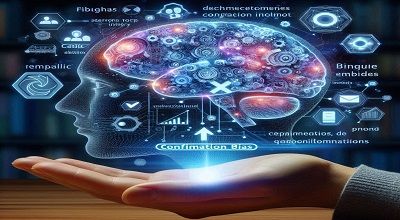Confirmation bias
Confirmation bias is a psychological phenomenon that affects how people process information. It refers to the tendency to seek out, interpret, and remember information that confirms one’s existing beliefs. While ignoring or rejecting information that contradicts them. The confirmation bias can influence our decisions, judgments, and opinions in various domains, such as politics, science, education, and health.
Confirmation bias can occur in different ways, such as:
- Biased search for information: People only look for evidence that supports their views and avoid them. Or disregard evidence that challenges them. For example, if someone believes vaccines are harmful, they might only read articles or watch videos confirming this belief. Ignore any scientific studies that show the benefits and safety of vaccines.
- Biased interpretation of information: This is when people interpret ambiguous or neutral information in a way. That favors their views and rejects or criticizes information that opposes them. For example, if someone believes that astrology is accurate, they might attribute any positive events in their life to their horoscope and dismiss any negative events as coincidences or exceptions.
- Biased recall of information: This is when people remember information that confirms their views more easily and vividly and forget. Or distort information that contradicts them. For example, if someone believes that they are a good driver, they might recall all the times they avoided accidents. Got compliments and forget or minimize all the times they made mistakes or got criticized.
Confirmation bias can have various causes and effects. Some possible causes are:
- Motivational factors: People may show confirmation bias because they want to maintain a positive self-image, avoid cognitive dissonance, or defend their values and identity. For example, someone may reject evidence that their favorite politician is corrupt because they don’t want to admit that they made a bad choice or that their values are compromised.
- Cognitive factors: People may show confirmation bias because they want to simplify and organize the complex and uncertain world, or because they rely on heuristics and shortcuts to process information. For example, someone may accept evidence that supports their stereotypes, because they don’t want to deal with the complexity and diversity of human behavior, or because they use stereotypes as a quick and easy way to categorize people.
Some possible effects are:
Poor decision-making: Confirmation bias can lead people to make irrational or suboptimal decisions, based on incomplete or inaccurate information. For example, someone may invest in a risky or fraudulent scheme. Because they only focus on the positive testimonials and ignore the negative reviews or warnings.
Resistance to change: Confirmation bias can make people resistant to changing their views or behavior. Even when faced with new or contradictory information. For example, someone may continue to smoke, because they only pay attention to the stories of smokers who lived long and healthy lives. Disregard the statistics and facts about the health risks of smoking.
Polarization and conflict: Confirmation bias can increase the polarization and conflict between different groups or individuals with different beliefs or opinions. For example, someone may become more extreme or radical in their political views. Because they only interact with people who share and reinforce their views and avoid or attack people who challenge or disagree with them.
Final Words
Confirmation bias is a common and natural human tendency, but it can also be harmful and irrational. Therefore, it is important to be aware of it and try to overcome it. By seeking out diverse and reliable sources of information, being open-minded and curious, and questioning one’s assumptions and biases,
